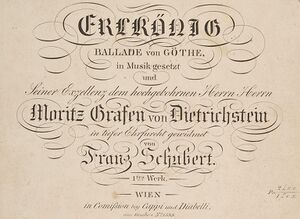Der Erlkönig
"Der Erlkönig" (eng.: Erlking, Alderking or Earlie-king (Aytoun and Martin)[1]) is arguably the most famous German ballad. Goethe describes a nightly ride on horseback. A father tries to reach his home, his feverish child in his arms. The story of the Erlkönig derives from the traditional Danish ballad Elveskud: Goethe's poem was inspired by Johann Gottfried Herder's translation of a variant of the ballad.[3] The poem was originally written by Goethe as part of a 1782 Singspiel, Die Fischerin (The [female] Fisher). It has been set to music many times. Best known is the version by Franz Schubert.[3]
| Der Erlkönig | |
|---|---|
| by Franz Schubert | |
 Title page of the first edition of Schubert's "Erlkönig" | |
| English | Erlking, Alderking or Earlie-king (Aytoun and Martin)[1] |
| Catalogue | D. 328 |
| Opus | Op. 1 |
| Genre | Lied |
| Language | German |
| Composed | 1815[2] |
| Published | 1821 |
The poem is not only gripping for its dire theme: a sick child who dies in the end, the sudden end a depiction of the emptiness and horror the father must feel. The son's and the father's view of the world occur at the same time which leaves the listener in doubt which level is real; the father's assurance that his sons' visions are just fantasies and cannot hurt him are arguably false.
The piece requires the singer to take more than one role. This frequently occurs in songs (Der Tod und das Mädchen, Das Heideröslein), but the dramatic exchange of the Alderking, the father, and the son still create a challenge for the performer.
There is also another aspect to the song: The Alderking is characterized as a reckless abuser. First, he tries to bribe the child, sweet-talking and acting as a child himself. He then raises his bid to golden fabrics and girls for a company (the Alderking's daughters). When this also fails, he admits his physical attraction and resorts to brute force.
"Der Erlkönig" appears on the following album:
| Year | Album | With |
|---|---|---|
| 2021 | À sa guitare (Album) | Thibaut Garcia |
"Der Erlkönig" is part of the following concert program:
| Year | Album | With |
|---|---|---|
| 2021 ‐ 2022 | À sa guitare (Concert program) | Thibaut Garcia |
Libretto
Franz Schubert (music), Johann Wolfgang von Goethe (words)
Wer reitet so spät durch Nacht und Wind? | |
Poetic translation | |
Who rides so late through the grisly night? Translation by by W. Edmonstoune Aytoun, D.C.I. and Theodore Martin[1]
*) Though Hof in German can refer to a castle; when it does, it is used like the term "court" in English. ("bei Hofe": "at court")."Hof" originally means "yard" (also synonymously used for household, or property). The way that Goethe uses it, it suggests the yard with the connotation of "his own property" as the most likely meaning, not the castle as Ayton and Martin assumed. | |
Manuscripts and sheet music
General information:
- Opus/Catalogue Number D.328 ; Op.1
- I-Catalogue Number IFS 194
- Year/Date of Composition 1815
- First edition:
- First Publication 1821 - Vienna: Diabelli & Cappi, Plate D. & C. No. 766, 11 pages (4th version)
- 1895 - Leipzig: Breitkopf und Härtel, Plates F.S. 504-506 (1st, 2nd, 3rd versions)[2]
References
- ↑ 1.0 1.1 1.2 W. Edmonstoune Aytoun, D.C.I. and Theodore Martin (1859). Poems and Ballads of Goethe. Edinburgh and London: William Blackwood and Sons. p. 63-64.
- ↑ 2.0 2.1 Schubert, Franz. "Erlkönig". IMSLP. Retrieved October 4, 2021.
- ↑ 3.0 3.1 "Erlkönig". Wikipedia. Archived from the original on October 1, 2021. Retrieved October 1, 2021.